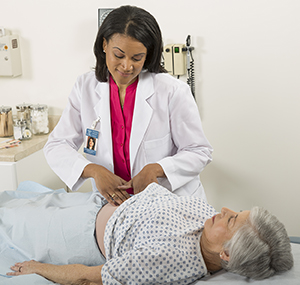A
B
C
D
E
F
G
H
I
J
K
L
M
N
O
P
Q
R
S
T
U
V
W
X
Y
Z
Click a letter to see a list of medical procedures beginning with that letter.
Click 'Back to Intro' to return to the beginning of this section.
Abdominal Pain
Abdominal pain means pain in the stomach or belly area. Everyone has this kind of pain from time to time. In many cases, it goes away on its own. Some types of abdominal pain can be from a serious problem. One example is appendicitis. So it’s important to know when to get help.

Causes of abdominal pain
There are many causes of abdominal pain. Common causes in adults include:
-
Constipation, diarrhea, or gas
-
Stomach and intestine inflammation from a virus or bacteria (gastroenteritis)
-
Stomach acid flowing back up into the esophagus (acid reflux)
-
Severe acid reflux, called gastroesophageal reflux disease (GERD)
-
A sore in the lining of the stomach or small intestine (peptic ulcer)
-
Inflammation of the gallbladder, liver, or pancreas
-
Gallstones or kidney stones
-
Appendicitis
-
Intestinal blockage
-
An internal organ pushing through a muscle or other tissue (hernia)
-
Urinary tract infections
-
Menstrual cramps
-
Fibroids in the uterus
-
Ovarian cysts
-
Pelvic inflammatory disease in women
-
Endometriosis
-
Crohn's disease
-
Ulcerative colitis
-
Irritable bowel syndrome
Diagnosing the cause of abdominal pain
Your healthcare provider will give you a physical exam. This is to help find the cause of your pain. If needed, you'll have tests. Belly pain has many possible causes. So it may take a little time to find the reason for your pain. Give details about the type of pain you feel. Tell your healthcare provider if it's sharp or dull. Tell them where and when you feel the pain. Tell them what makes it better or worse. And tell them if you have other symptoms such as:
Tell your healthcare provider:
-
If you have a family history of stomach or intestinal problems or cancer
-
About your alcohol use and any illegal drug use
-
All medicines you take, both prescription and over-the-counter
-
What vitamins, herbs, and other supplements you take
Treating abdominal pain
Some causes of pain need emergency medical care right away. These include appendicitis or a bowel blockage. Other problems can be treated with rest, fluids, or medicines. Your healthcare provider can give you instructions. You may need treatment or self-care based on what's causing your pain.
If you have vomiting or diarrhea, sip water or other clear fluids. When you're ready to eat solid foods again, start lightly. Eat small amounts of easy-to-digest, low-fat foods. These include applesauce, toast, or crackers.
Call 911
Call 911 right away if you:
-
Can’t pass stool and are vomiting
-
Are vomiting blood
-
Have bloody diarrhea or black, tarry diarrhea
-
Have chest, neck, or shoulder pain
-
Feel like you might pass out (faint)
-
Have pain in your shoulder blades and nausea
-
Have sudden, severe belly pain
-
Have new, severe pain unlike any you've felt before
-
Have a belly that is rigid, hard, and hurts to touch
When to call the healthcare provider
Call your healthcare provider or seek medical care right away if you have any of these:
-
Pain that's worse or not getting better
-
Bloating that's worse or not getting better
-
Diarrhea that's worse or not getting better
-
Fever of 100.4°F (38°C) or higher, or as advised
-
Weight loss for no reason
-
Continued lack of appetite
-
Blood in your stool
How to prevent abdominal pain
Here are some tips to help prevent abdominal pain:
-
Eat smaller amounts of food at each meal.
-
>Don't eat greasy, fried, or other high-fat foods.
-
Don't eat foods that give you gas.
-
Exercise regularly.
-
Drink plenty of fluids.
To help prevent GERD symptoms:
-
Quit smoking.
-
Reduce alcohol and foods that increase stomach acid.
-
Don't use aspirin or nonsteroidal anti-inflammatory drugs (NSAIDs).
-
Lose excess weight.
-
Finish eating at least 2 hours before you go to bed or lie down.
-
Raise the head of your bed.
Online Medical Reviewer:
Marianne Fraser MSN RN
Online Medical Reviewer:
Rajadurai Samnishanth
Online Medical Reviewer:
Rita Sather RN
Date Last Reviewed:
3/1/2024
© 2000-2026 The StayWell Company, LLC. All rights reserved. This information is not intended as a substitute for professional medical care. Always follow your healthcare professional's instructions.